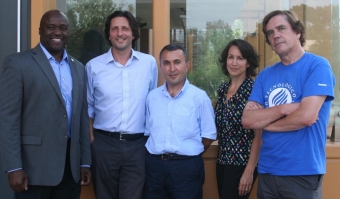UCI engineers develop prototype of low-cost, disposable lung Infection Detector
NSF grant supports their efforts to improve manufacturing process for nanodevices
 Imagine a low-cost, disposable breath analysis device that a person with cystic fibrosis could use at home along with a smartphone to immediately detect a lung infection, much like the device police use to gauge a driver’s blood alcohol level.
Imagine a low-cost, disposable breath analysis device that a person with cystic fibrosis could use at home along with a smartphone to immediately detect a lung infection, much like the device police use to gauge a driver’s blood alcohol level.
Timely knowledge of a lung infection would let people with CF or other inflammatory respiratory conditions seek immediate treatment and thereby prevent life-shortening permanent damage to their already vulnerable airways.
Thanks to a nearly $1.3 million grant from the National Science Foundation, UC Irvine engineers can continue developing this type of nanotechnology device – and potentially many others – using a more wide-scale manufacturing process.
Materials scientist Regina Ragan and electrical engineer Filippo Capolino have created a nano-optical sensor that can detect trace levels of infection in a small sample of breath. They made the sensor in the laboratory but would like to see it become commercially available. In addition to diagnosing medical conditions, the device could be modified to monitor environmental conditions – for instance, identifying harmful airborne agents produced through automotive or chemical industry practices.
Nanotechnologies such as this sensor depend on extremely small, nanometer-scale building blocks. A nanometer is about 100,000 times smaller than the width of a human hair. Fabricating on this tiny scale poses huge challenges, since most of the current methods that achieve a high level of precision are too costly and slow to be viable for manufacturing.
“With support from the NSF and input from industry, our goal is to help nanoscale manufacturing processes leave the laboratory – where they’ve been confined – and become usable in widespread commercial applications,” said Ragan, associate professor of chemical engineering & materials science and principal investigator on the project.
This grant highlights the strength of our faculty in both nanosciences and advanced manufacturing,” said Gregory Washington, dean of The Henry Samueli School of Engineering. “The Samueli School is poised to move forward as a force in this area.”
Co-principal investigators are Capolino, associate professor of electrical engineering & computer science; Ozdal Boyraz, associate professor of electrical engineering & computer science; and Marc Madou, Chancellor’s Professor of mechanical & aerospace engineering.
